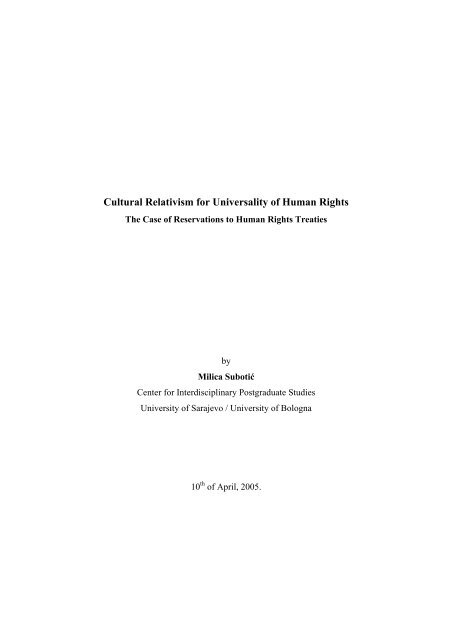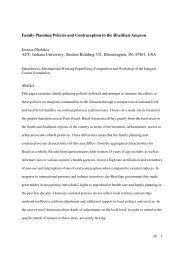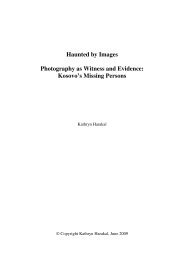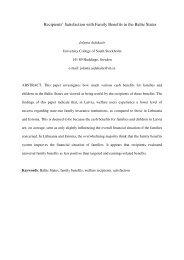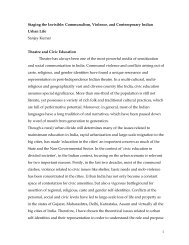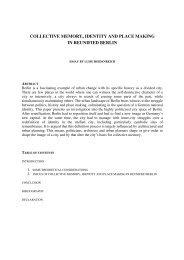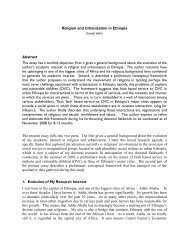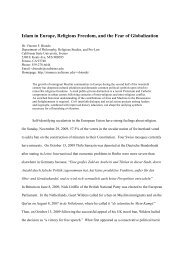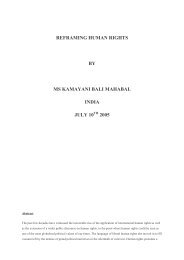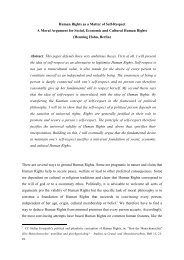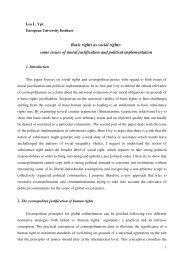Cultural Relativism for Universality of Human Rights
Cultural Relativism for Universality of Human Rights
Cultural Relativism for Universality of Human Rights
You also want an ePaper? Increase the reach of your titles
YUMPU automatically turns print PDFs into web optimized ePapers that Google loves.
<strong>Cultural</strong> <strong>Relativism</strong> <strong>for</strong> <strong>Universality</strong> <strong>of</strong> <strong>Human</strong> <strong>Rights</strong><br />
The Case <strong>of</strong> Reservations to <strong>Human</strong> <strong>Rights</strong> Treaties<br />
by<br />
Milica Subotić<br />
Center <strong>for</strong> Interdisciplinary Postgraduate Studies<br />
University <strong>of</strong> Sarajevo / University <strong>of</strong> Bologna<br />
10 th <strong>of</strong> April, 2005.
Abstract<br />
Until October 2004, over ninety per cent <strong>of</strong> all United Nations Members have became State<br />
Parties to the Convention on the Elimination <strong>of</strong> All Forms <strong>of</strong> Discrimination<br />
against Women (CEDAW). On the other hand, the CEDAW has the highest number <strong>of</strong><br />
entered reservations <strong>of</strong> all the major international human rights treaties<br />
adopted under the auspices <strong>of</strong> the UN. Almost all States with strong Islamic<br />
tradition and States with great number <strong>of</strong> Muslim population had entered<br />
reservations. High number <strong>of</strong> reservations reflects a more fundamental conflict that is not<br />
only related to women’s human rights law, but also <strong>for</strong> international human rights law theory<br />
and practice. It is a conflict between the idea <strong>of</strong> universalism <strong>of</strong> human rights and cultural<br />
relativism on the other hand. However, even though such reservations are not permitted under<br />
the Vienna Convention on the Law <strong>of</strong> Treaties, I argue that they represent a strong instrument<br />
<strong>for</strong> spreading and promoting the recognition <strong>of</strong> the universality <strong>of</strong> human rights. If<br />
universality <strong>of</strong> human rights means universal recognition <strong>of</strong> pluralism and difference, the<br />
mechanism <strong>of</strong> reservations may be the way <strong>of</strong> engagement <strong>of</strong> all cultural traditions in the<br />
process <strong>of</strong> promoting and sustaining human rights. Otherwise, demand <strong>for</strong> full adherence and<br />
excluding <strong>of</strong> all reservations leads to an elitist treaty with only a few state parties.
Introduction<br />
Until October 2004, over ninety per cent <strong>of</strong> all UN Members have became State<br />
Parties to the Convention on the Elimination <strong>of</strong> All Forms <strong>of</strong> Discrimination<br />
against Women. 1 On the other hand, the CEDAW has the highest number <strong>of</strong> entered<br />
reservations <strong>of</strong> all the major international human rights treaties adopted<br />
under the auspices <strong>of</strong> the UN. Almost all States with strong Islamic<br />
tradition and States with great number <strong>of</strong> Muslim population had entered<br />
reservations. Some States have entered reservations directly invoking Sharia law, while<br />
some others based them on the codification <strong>of</strong> Sharia as a domestic family law. High number<br />
<strong>of</strong> reservations reflects a more fundamental conflict that is not only related to women’s human<br />
rights law, but also <strong>for</strong> international human rights law theory and practice. It is a conflict<br />
between the idea <strong>of</strong> universalism <strong>of</strong> human rights and cultural relativism on the other hand.<br />
In this essay I will argue that some <strong>of</strong> the reservations to the CEDAW that invoke<br />
Islamic law are incompatible with the object and purpose <strong>of</strong> the Convention. They undermine<br />
its main goals, which are elimination <strong>of</strong> all <strong>for</strong>ms <strong>of</strong> discrimination against women and<br />
equality between men and women. However, my main argument will be that even though<br />
such reservations are not permitted under the Vienna Convention on the Law <strong>of</strong> Treaties, they<br />
do represent a strong instrument <strong>for</strong> spreading and promoting the recognition <strong>of</strong> the<br />
universality <strong>of</strong> human rights. 2<br />
This essay will involve an analysis <strong>of</strong> the reservations as an instrument, reservations<br />
made on human rights treaties in general and reservations made to the CEDAW invoking<br />
Sharia Law. Firstly, I study the rules <strong>of</strong> the law <strong>of</strong> treaties on reservations in order to see if<br />
and how these rules can be applied to reservations to human rights treaties. Secondly, I<br />
discuss some reservations to the CEDAW, with respect to the VCLT in order to determine<br />
their validity. Thirdly, I will examine the conflict between the intended universalism <strong>of</strong> the<br />
CEDAW and cultural relativism in Muslim States that made reservations.<br />
I. General Principles <strong>of</strong> International Law Governing Treaty Reservations and their<br />
Permissibility to <strong>Human</strong> <strong>Rights</strong> Treaties<br />
1.1. The Law Applicable to Reservations<br />
1 Adopted by the General Assembly in 1979 and come into <strong>for</strong>ce in 1981, hereafter: CEDAW<br />
2 Adopted on the Vienna Conference in 1969 and came into <strong>for</strong>ce in 1980, hereafter: VCLT
After tremendous changes in the international society since 1945, the primary sources<br />
<strong>of</strong> modern international law have become multilateral law-making treaties. Initially,<br />
international treaties were either part <strong>of</strong> customary international law, or they belonged to the<br />
general principles <strong>of</strong> law. Today the rules governing international treaties are codified in the<br />
VCLT. Malnczuk has noticed that the importance <strong>of</strong> the VLCT lies in the fact that most <strong>of</strong> its<br />
provisions attempt to codify the customary law relating to treaties, although there are other<br />
provisions which represent a “progressive development” rather than a codification <strong>of</strong> the law. 3<br />
According to Lijnzaad reservations to human rights treaties as multilateral law-making<br />
treaties are a relatively new problem in international law 4 . Moreover, Ruda's believes that the<br />
question <strong>of</strong> reservations has been one <strong>of</strong> the most controversial subjects <strong>of</strong> contemporary<br />
international law. 5 The question is why is that so?<br />
Traditionally, a reservation made subsequent to the conclusion <strong>of</strong> a treaty requires the<br />
unanimous acceptance <strong>of</strong> all the other treaty parties, unless the treaty provides differently. 6<br />
However, a view advancing the importance and desirability <strong>of</strong> widespread participation in<br />
treaties, especially human rights treaties, gained currency. This led to the recognition <strong>of</strong> the<br />
need to evolve a flexible system whereby consent <strong>of</strong> all contracting States to reservations<br />
entered by co-contractants was not considered essential. The Genocide case marks the first<br />
major departure from the unanimity rule and thus an important crossroad in the development<br />
<strong>of</strong> contemporary theory on reservations to multilateral treaties. 7 It has found that the<br />
traditional theory could not be applied to the Genocide Convention, which sought to protect<br />
individuals, instead <strong>of</strong> conferring reciprocal rights on the contracting parties. 8 The<br />
International Court <strong>of</strong> Justice ruled that the object and purpose <strong>of</strong> the Convention limit the<br />
freedom <strong>of</strong> making reservations and that <strong>of</strong> objecting to them. This rule along with other legal<br />
principles concerning the effect <strong>of</strong> reservations was later codified in the VCLT and as<br />
3 th<br />
Malnczuk, P., Akehurst’s Modern Introduction to International law, 7 revised ed., Routledge 1997<br />
4<br />
She argued that while it has been possible to find solutions to the question <strong>of</strong> reservations in the customary law<br />
<strong>of</strong> treaties, the issue <strong>of</strong> reservations to human rights treaties only appeared when international law turned its<br />
attention to the protection <strong>of</strong> individuals; Lijnzaad, L., RESERVATIONS TO UN-HUMAN RIGHTS TREATIES:<br />
RATIFY AND RUIN? Dordrecht/Boston/London, Martiuns Nijh<strong>of</strong>f Publishers, 1995<br />
5<br />
Ruda J.D., cited by Lijnzaad, L., RESERVATIONS TO UN-HUMAN RIGHTS TREATIES: RATIFY AND<br />
RUIN? Dordrecht/Boston/London, Martiuns Nijh<strong>of</strong>f Publishers, 1995<br />
6<br />
On this basis a reservation constituted a counter-<strong>of</strong>fer that required a new acceptance, failing which the state<br />
making the counter-<strong>of</strong>fer would not become a party to the treaty. According to Bronville, this view rest on<br />
contractual conception <strong>of</strong> the absolute integrity <strong>of</strong> the treaty as adopted.<br />
7<br />
Reservations to the Convention on the Prevention and Punishment <strong>of</strong> the Crime <strong>of</strong> Genocide ICJ Reports, 1951,<br />
p15,<br />
8<br />
The International Court <strong>of</strong> Justice declared that “ an objection to a minor reservation” should not have the<br />
effect <strong>of</strong> invalidating the ratification. It looks like a majority opinion in the ICJ has tried to achieve an adequate<br />
balance between the objectives <strong>of</strong> preservation <strong>of</strong> the integrity <strong>of</strong> the text <strong>of</strong> the treaty and universality <strong>of</strong><br />
participation in the treaty. (Reservations to the Convention on the Prevention and Punishment <strong>of</strong> the Crime <strong>of</strong><br />
Genocide ICJ Reports , 1951, p15. cited by Lijnzaad, L., RESERVATIONS TO UN-HUMAN RIGHTS<br />
TREATIES: RATIFY AND RUIN? Dordrecht/Boston/London, Martiuns Nijh<strong>of</strong>f Publishers, 1995
Lijnzaad has noticed become a yardstick <strong>for</strong> dealing with issues <strong>of</strong> reservations to human<br />
right treaties. 9<br />
In the article 2.1 (d) <strong>of</strong> the VCLT, a reservation is defined as “a unilateral statement,<br />
however phrased or named, made by a State when signing, ratifying, accepting, approving or<br />
acceding to a treaty, whereby it purports to exclude or modify the legal effect <strong>of</strong> certain<br />
provisions <strong>of</strong> the treaty in their application to that State”. Article 19 <strong>of</strong> the VCLT indicates the<br />
general liberty to <strong>for</strong>mulate a reservation and then states three exceptions. Exception<br />
prescribed in sub-paragraph (c) <strong>of</strong> article 19 has caused many controversial opinions; it reads<br />
that reservations are impermissible if “incompatible with the object and purpose <strong>of</strong> the<br />
treaty”. Furthermore, a flexible and in “favor treaty” system concerning reservations is laid<br />
down in article 20 which deals with acceptance <strong>of</strong> reservations. 10 Similarly, the rule regulating<br />
States objections to reservations could be considered in context <strong>of</strong> the above mentioned<br />
“progressive development”. A fact that objection do not preclude the entry into <strong>for</strong>ce <strong>of</strong> the<br />
treaty between the reserving State and objecting State, unless a contrary intention is definitely<br />
expressed by objecting State (article 20.4.b.) is the compliment to flexible system, in which<br />
the treaty is in the <strong>for</strong>ce in different modes between various states.<br />
1.2. The “Object and Purpose” <strong>of</strong> <strong>Human</strong> <strong>Rights</strong> Treaties<br />
Be<strong>for</strong>e embarking on the legal aspects <strong>of</strong> reservations to human rights treaties we may<br />
say that many authors have tried to find out what could be the main reasons <strong>for</strong> making<br />
reservations on human rights treaties. 11<br />
Lijnzaad argued that article 19 (c) is a necessary rule, designed to prevent States, when<br />
expressing consent to be bound, from undermining the very raison d’etre <strong>of</strong> the treaty by<br />
making reservations incompatible with the object and the propose <strong>of</strong> the treaty. The majority<br />
9 Lijnzaad, L., RESERVATIONS TO UN-HUMAN RIGHTS TREATIES: RATIFY AND RUIN?<br />
Dordrecht/Boston/London, Martiuns Nijh<strong>of</strong>f Publishers, 1995<br />
10 Acceptance <strong>of</strong> all States parties is not required, as the treaty enters into <strong>for</strong>ce between reserving State and each<br />
State that accepts reservation; rule <strong>of</strong> tacit acceptance article 20 (5), means that States who do not accept a<br />
reservations will have to object<br />
11 According to Lijnzaad, position <strong>of</strong> developing countries may lead to reservations, prompted by the lack <strong>of</strong><br />
financial means that makes it impossible to attain a particular goal set in human rights treaty. (Lijnzaad,<br />
Liesbeth, RESERVATIONS TO UN-HUMAN RIGHTS TREATIES: RATIFY AND RUIN?<br />
Dordrecht/Boston/London, Martiuns Nijh<strong>of</strong>f Publishers, 1995). Also, as Cooccia has noted, a number <strong>of</strong><br />
reservations are directly related to the problems <strong>for</strong>eseen at the implementation <strong>of</strong> the human right treaty in the<br />
domestic legal order. In giving rules meant to govern the relationship between the state and the individuals under<br />
its jurisdiction, collision between these rules and preexisting domestic rules may occur.(Coocia,M, cited br<br />
Lijnzaad, L., RESERVATIONS TO UN-HUMAN RIGHTS TREATIES: RATIFY AND RUIN?<br />
Dordrecht/Boston/London, Martiuns Nijh<strong>of</strong>f Publishers, 1995) Another mentioned reason <strong>for</strong> making<br />
reservations is uncertainty <strong>of</strong> the obligations accepted under <strong>of</strong> treaty. (Cook, R. J, Reservations to the<br />
Convention on the Elimination <strong>of</strong> All Forms <strong>of</strong> Discrimination Against Women, 30 VIRGINIA JOURNAL OF<br />
INTERNATIONAL LAW, 643-709 1990)
<strong>of</strong> human rights treaties concluded after the VCLT either contained express clauses on<br />
reservations referring to the VCLT or reproducing its criteria <strong>of</strong> the “object and purpose” <strong>of</strong><br />
the treaty. Still, none <strong>of</strong> these treaties including the VCLT does not give an answer to the<br />
question what "object and purpose" are or give some potential methods <strong>for</strong> its determination.<br />
According to Bronwille the “compatibility” test is the least objectionable solution but is by no<br />
means an ideal regime and many problems remain. 12 Cook states that tests are objective and<br />
justiciable and do not turn simply on whether other States parties have expressly or tacitly<br />
accepted a particular reservation or have objected to it. 13 However, Clark and majority <strong>of</strong><br />
writers point out that it appears that although the standard is intended to be an objective one, it<br />
is subjectively applied; compatibility is assessed by the sole judgement <strong>of</strong> every other State<br />
party. 14<br />
Also, it could be said that the "object and purpose" presume the option <strong>of</strong><br />
distinguishing between “obligations in the treaty” and the “core” obligations that are the<br />
treaty’s raison d’etre. But, many writers noticed that there are no rules available as to show<br />
how this should be done. 15<br />
II. Reservations to the CEDAW<br />
2.1. Brief Overview <strong>of</strong> the CEDAW<br />
As Cook has noted, the CEDAW is an international instrument universal in reach,<br />
comprehensive in scope and legally binding in character. 16 The Preamble is referring to the<br />
equal rights <strong>of</strong> men and women, but it also recognizes the need to go beyond and address<br />
factors which will help to destroy not just de iure but also de facto inequality.<br />
Article 1 defines discrimination against women. Commentators (Cook,<br />
Coomaraswamy) have stressed the consequence <strong>of</strong> this definition as it expressly addresses the<br />
traditional distinction between public and private spheres. 17 Liberal theory <strong>of</strong> the minimal<br />
12 Brownile, I., Principles <strong>of</strong> Public International Law, Ox<strong>for</strong>d University Press, 2003.<br />
13 Cook, R. J, Reservations to the Convention on the Elimination <strong>of</strong> All Forms <strong>of</strong> Discrimination Against Women,<br />
30 VIRGINIA JOURNAL OF INTERNATIONAL LAW, 643-709,1990<br />
14 Clark, B.The Vienna Convention Reservations Regime and the Convention on<br />
Discrimination Against Women , American Journal <strong>of</strong> International Law, 1991<br />
15 Cook suggests that one way <strong>of</strong> addressing the issue in respect <strong>of</strong> the non-discrimination treaties, would be to<br />
look at the area in which the core <strong>of</strong> discrimination lies. (Cook, R. J, Reservations to the Convention on the<br />
Elimination <strong>of</strong> All Forms <strong>of</strong> Discrimination Against Women) On the other side, Lijnzzad has noticed that those<br />
divisions are contrary to the view that human rights norms are coherent set <strong>of</strong> rules protecting the fundamental<br />
freedoms <strong>of</strong> people and reduce the authority <strong>of</strong> non-core rights. (Lijnzaad, L, RESERVATIONS TO UN-<br />
HUMAN RIGHTS TREATIES: RATIFY AND RUIN?)<br />
16 Cook, R.J, Reservations to the Convention on the Elimination <strong>of</strong> All Forms <strong>of</strong> Discrimination Against Women,<br />
30 VIRGINIA JOURNAL OF INTERNATIONAL LAW, 643-709,1990<br />
17 “Women's issues are frequently treated as "beyond justice" simply because they take place on the private side<br />
<strong>of</strong> the schism between the public and private spheres.” Cook, Rebecca J, Reservations to the Convention on the
state and a fear <strong>of</strong> state monopoly <strong>of</strong> private life contributed to the rigid dichotomy between<br />
the public and the private, a dichotomy that until recently was the unshakable foundation <strong>of</strong><br />
international law in general, and international human rights, in particular. Article 2 refers to<br />
effect as well as purpose, thus directing attention to the consequences <strong>of</strong> governmental<br />
measures as well as the intentions underlying them. Article 5 obligates States parties to do no<br />
less than to modify the conduct pattern <strong>of</strong> its citizens. According to Mullally, the traditional<br />
justification <strong>of</strong> denying human rights to women on the basis <strong>of</strong> established customs and<br />
practices is thus directly challenged and rendered unacceptable. The private sphere can no<br />
longer be conceptualized as one <strong>of</strong> the freedoms.<br />
2.2. Permissibility <strong>of</strong> the “Islamic” Reservations to the CEDAW<br />
Many <strong>of</strong> the states that have become parties to the CEDAW have been unwilling to<br />
accept the full scope <strong>of</strong> obligations and in accordance with article 28 they have entered<br />
reservations to one or more articles. Article 28 <strong>of</strong> the CEDAW adopts the impermissibility<br />
principle contained in the VCLT. Butegwa writes that what is insightful is that some <strong>of</strong> the<br />
States entered reservations on articles they purport to accept in the context <strong>of</strong> other human<br />
rights instruments. 18<br />
A subject that deserves special attention are reservations referring to overriding<br />
importance <strong>of</strong> the Sharia law. 19 Articles 2, 9, and 16 (either in full or partially) have attracted<br />
most attention. As mentioned in Chapter I, the CEDAW does not contain a specific criterion<br />
as to what the “object and purpose” is. The question is are the “Islamic” reservations<br />
compatible with the CEDEW most important goals - elimination <strong>of</strong> all <strong>for</strong>ms <strong>of</strong><br />
discrimination against women and establishing de iure and de facto equality between men and<br />
women?<br />
Elimination <strong>of</strong> All Forms <strong>of</strong> Discrimination Against Women, 30 VIRGINIA JOURNAL OF INTERNATIONAL<br />
LAW, 643-709 (1990)<br />
"A revolution has taken place in the last decade. Women's rights have been catapulted onto human rights agenda<br />
with a speed and determination that has rarely been matched in international law." Radhika Coomaraswamy,<br />
Reinventing International Law: Women's <strong>Rights</strong> as <strong>Human</strong> <strong>Rights</strong> in the International Community,Harvard Law<br />
School <strong>Human</strong> <strong>Rights</strong> Program, 1997., http://www.law.harvard.edu/programs/HRP/Publications/radhika.html<br />
18 Butegwa F., International <strong>Human</strong> <strong>Rights</strong> Law and Practice: Implications <strong>for</strong> Women, 1998<br />
19 Islamic tradition consist <strong>of</strong> one <strong>of</strong> the following sources: the Qur'an or the Book <strong>of</strong> Revelation; Sunnah or the<br />
practical traditions <strong>of</strong> the Prophet Muhammad; Hadith or the oral sayings attributed to the Prophet Muhammad;<br />
Fiqh (Jurisprudence) or Madahib (Schools <strong>of</strong> Law); and the Shari'ah or code <strong>of</strong> law which regulates the diverse<br />
aspects <strong>of</strong> a Muslim's life. These "sources" have contributed to what is cumulatively referred to as "the Islamic<br />
tradition". Rifat H., <strong>Rights</strong> <strong>of</strong> women Within Islamic Communities ed.John.Write, Jr. Religios <strong>Human</strong> <strong>Rights</strong> in<br />
Global perspectine, Dordrecht/Boston/London, Martiuns Nijh<strong>of</strong>f Publishers, 1996
In order to give an answer to this question, firstly I will try to give a brief overview <strong>of</strong><br />
modern Islamic tradition concerning women. 20 Commonly, focus <strong>of</strong> the Sharia has always<br />
been in matters <strong>of</strong> personal status, including marriage, divorce, child custody, maintenance,<br />
succession, legal capacity. Generally it could be said that the women are considered inferior<br />
to men, and have fewer rights and responsibilities, simply man and women are not equal,<br />
especially in family matters. As Gieryck has noticed the Sharia law is based on the principle<br />
<strong>of</strong> male guardianship over women. 21<br />
For example, Rifat states that Muslim societies have made divorce extremely difficult<br />
<strong>for</strong> women, both legally and trough social penalties, nationality <strong>of</strong> the children, possibility <strong>of</strong><br />
repudiation (unilateral separation) <strong>of</strong> women by her husband, etc. 22 If we know that lots <strong>of</strong><br />
discrimination against women takes place in their own home by their husbands and families,<br />
we may consider that obligations <strong>of</strong> the State arose from the article 16 <strong>of</strong> the CEDAW,<br />
concerning the equality in all matters relating to marriage and family life is the one <strong>of</strong> the<br />
“core” obligations. 23 Most <strong>of</strong> the “Islamic” States entered reservations on this article invoking<br />
Sharia law. These reservations purport to limit the parties' core obligation, and in accordance<br />
with the Article 28 are not permitted.<br />
III. Demonstration <strong>of</strong> <strong>Cultural</strong> <strong>Relativism</strong> through Reservations to <strong>Human</strong> <strong>Rights</strong><br />
Treaties<br />
3.1. <strong>Universality</strong> <strong>of</strong> <strong>Human</strong> <strong>Rights</strong> and Reservations to <strong>Human</strong> <strong>Rights</strong> Treaties<br />
Although human rights are embodied in treaties drafted within the framework <strong>of</strong> the<br />
UN, the issue is whether their validity is based on universal ethical or moral beliefs. The idea<br />
that all humans have inalienable and universal human rights was a driving <strong>for</strong>ce in creating<br />
the UN System by signing the 1945 Charter. The UDHR <strong>of</strong> 1948 has a central role in<br />
establishing the contours <strong>of</strong> the contemporary consensus on internationally recognized human<br />
rights. 24 The Vienna Declaration and Program <strong>of</strong> Action (1993) boldly asserts that the<br />
20 Many writers make difference between Islam theory and practice. Elmadmad states that it can be explained in<br />
terms <strong>of</strong> the different ways the Islamic sects and schools have been interpreting the Qur'anic proclamations<br />
concerning women. Elmadmad, K, Women’ <strong>Rights</strong> under Islam, <strong>Human</strong> right <strong>of</strong> Women: International<br />
Instruments and African experiences, ed. by Wolfgang Benedek, Zed Books 2002<br />
21 Gieryck D., Women’ <strong>Rights</strong> under Islam, <strong>Human</strong> right <strong>of</strong> Women: International Instruments and African<br />
experiences, ed. by Wolfgang Benedek, Zed Books 2002)<br />
22 Rifat H., <strong>Rights</strong> <strong>of</strong> women Within Islamic Communities ed.John.Write, Jr. Religios <strong>Human</strong> Rigts in Global<br />
perspectine, Dordrecht/Boston/London, Martiuns Nijh<strong>of</strong>f Publishers, 1996<br />
23 There are number <strong>of</strong> suggestions about the answer what the “core” obligations are. Majority <strong>of</strong> writers (Cook,<br />
Lijnzardd) but also CEDAW Committee believes that Articles 2, 9 and 16 are “core” articles <strong>of</strong> the Convention.<br />
24 Article 1 <strong>of</strong> the Declaration <strong>of</strong> <strong>Human</strong> <strong>Rights</strong> states: "All human beings are born free and equal in dignity and<br />
rights. They are endowed with reason and conscience and should act towards one another in a spirit <strong>of</strong><br />
brotherhood.
universal nature <strong>of</strong> human rights is beyond question. 25 According to Alston the fact that<br />
various human rights instruments have been drafted within the framework <strong>of</strong> the UN and have<br />
been widely ratified is a pro<strong>of</strong> <strong>for</strong> the existence <strong>of</strong> universally shared values. 26<br />
However, if we look into the first two Chapters <strong>of</strong> this essay it could be concluded that<br />
although a large majority <strong>of</strong> the States may be <strong>for</strong>mally bound by a treaty, entering<br />
reservations on some provisions allows <strong>for</strong> parties not to be equally binding, thus substantive<br />
rights will not be available <strong>for</strong> all individuals. It could be said that universal adherence to<br />
human rights treaties, with many reservations is just a <strong>for</strong>mal universality <strong>of</strong> human rights and<br />
human rights law. In the analysis <strong>of</strong> reservations to the CEDAW invoking the Sharia law we<br />
saw that these reservations have deep roots in different cultural and religious beliefs. Having<br />
in mind that these reservations undermine the main goals <strong>of</strong> the treaty, one could ask is it<br />
possible to speak about universality <strong>of</strong> human rights. There<strong>for</strong>e, the question to be asked is:<br />
are the present internationally recognized standards <strong>of</strong> human rights legitimate on the<br />
universal level?<br />
3.2. Universalism vs. <strong>Cultural</strong> <strong>Relativism</strong><br />
However, a concept <strong>of</strong> universality <strong>of</strong> human rights has become one <strong>of</strong> the<br />
cornerstones <strong>of</strong> the international human rights framework. There exists a very well known<br />
debate between the two ideas, the idea <strong>of</strong> universalism <strong>of</strong> human rights and <strong>of</strong> cultural<br />
relativism. As Ignatieff points out, the cultural provocation to the universality <strong>of</strong> human rights<br />
arises from three distinct sources: from resurgent Islam, from within the West itself, and from<br />
East Asia. 27 Each <strong>of</strong> these challenges is independent <strong>of</strong> the others, but taken together, they<br />
have raised some questions about the validity and the legitimacy <strong>of</strong> human rights norms.<br />
Referring to the Saudi Arabia objection to article 16, relating to free marriage choice<br />
<strong>of</strong> the UDHR Ignatieff writes that the challenge from Islam has been there from the<br />
beginning. 28 Today some scholars from Islamic countries argue that human rights discourse is<br />
not universal but a product <strong>of</strong> the European Enlightenment and its particular cultural<br />
development. 29 The freedoms articulated in the UDHR make no sense within the theocratic<br />
bias <strong>of</strong> Islamic thought. Governments in many Islamic countries <strong>of</strong>ten underscore this view<br />
25 Article 1 <strong>of</strong> Vienna Declaration and Programme <strong>of</strong> Action, adopted by the World Conference on <strong>Human</strong><br />
<strong>Rights</strong> on 25 June 1993.<br />
26<br />
Alston, P, Is <strong>Universality</strong> in jeopardy?, The United Nations and the elliptical notion <strong>of</strong> the universality <strong>of</strong><br />
human rights, UNDPI, New York, 1987<br />
27<br />
Ignatieff, M., THE ATTACK ON HUMAN RIGHTS,:, Foreign Affairs, 00157120, Nov/Dec2001, Vol. 80, Issue<br />
6<br />
28 Ignatieff, M., THE ATTACK ON HUMAN RIGHTS,:, Foreign Affairs, 00157120, Nov/Dec2001, Vol. 80, Issue<br />
6<br />
29 Baderin M., International <strong>Human</strong> <strong>Rights</strong> and Islamic Law, Ox<strong>for</strong>d University Press, 2002
with particular respect to women's rights. Women are <strong>of</strong>ten seen as a symbol <strong>of</strong> a particular<br />
cultural order, as icons <strong>of</strong> cultural purity. In Western theory, the “attack” on the idea <strong>of</strong><br />
universality <strong>of</strong> human rights firstly has come from Pollis and Schwab, who see human rights<br />
as a Western construct <strong>of</strong> limited applicability. 30 The third objection has came from Asian<br />
countries and can be summarized in words <strong>of</strong> Singapore’s Senior Minister Lee Kuan Yew<br />
who has said that Asians have "little doubt that a society with communitarian values where<br />
the interests <strong>of</strong> society take precedence over that <strong>of</strong> the individual suits them better than the<br />
individualism <strong>of</strong> America."<br />
Many universalists do not deny cultural relativity. The relativist critique has given rise<br />
to a new appreciation <strong>of</strong> the need <strong>for</strong> greater cultural sensitivity, including the need to develop<br />
more adequate cross-cultural foundations <strong>for</strong> the development <strong>of</strong> modern theories <strong>of</strong> human<br />
rights. <strong>Human</strong> rights thinkers are trying to find out what is the foundation <strong>of</strong> principles <strong>of</strong><br />
universalism embodied in the UDHR. Some <strong>of</strong> them argue that universalism is rooted in<br />
tradition <strong>of</strong> tolerance and universality in different cultures and religion from around the<br />
world. 31 Parekh points out that concepts <strong>of</strong> justice and law, the legitimacy <strong>of</strong> government, the<br />
dignity <strong>of</strong> the individual, protection from oppressive or arbitrary rule are found in every<br />
society and those values are embedded in all human societies. 32 Sen suggests that in<br />
identifying the historical antecedents <strong>of</strong> the idea <strong>of</strong> human rights we should seek those<br />
elements that are consistent with and supportive and not the non-consistent ones. 33<br />
On the contrary, Donnelly claims that the foundation and source is human nature and<br />
rights are needed not <strong>for</strong> life but <strong>for</strong> life <strong>of</strong> dignity. 34 He argues that Western theory and<br />
practice has a central role in the social construction <strong>of</strong> dominant international human rights.<br />
Furthermore, he writes that international consensus on the system <strong>of</strong> human rights rooted in<br />
the UDHR is so-called Rawlsian idea <strong>of</strong> “overlapping consensus” which means a practical<br />
normative consensus on political and legal justice in a pluralistic society. 35<br />
30 Pollis, A., Peter S., “<strong>Human</strong> <strong>Rights</strong> and Western construct with Limited applicability”, New York:Praeger<br />
1980, cited by Donnelly, Jack, Universal <strong>Human</strong> <strong>Rights</strong>, 2 n ed. Cornell University Press 2003<br />
31 See Kushalani, Y., <strong>Human</strong> <strong>Rights</strong> in Asia and Africa, <strong>Human</strong> <strong>Rights</strong> Law Journal No.4, 1983, Parekh,<br />
Rethinking Multiculturalism, Macmillan Press Ltd.2000<br />
32 Bhikhu Parekh, Rethinking Multiculturalism, Macmillan Press Ltd.2000<br />
33 As an example she investigates Confucianism and suggest that certain elements within<br />
Confucious’ Analects which are not consistent with international human rights standards does<br />
not undermine the validity <strong>of</strong> other consistant elements, Sen,<br />
34 Donnelly, Jack, Universal <strong>Human</strong> <strong>Rights</strong>, 2 n ed. Cornell University Press 2003<br />
35 Whereas comprehensive philosophical or religious doctrines are unlikely to get general support in pluralistic<br />
societies, the concept <strong>of</strong> political justice is defined by Rawls as entailing only limited normative demand on<br />
certain norms that ought to govern human behavior. Donnelly, Jack, Universal <strong>Human</strong> <strong>Rights</strong>, 2 n ed. Cornell<br />
University Press 2003
Many authors (An-Na'im, Basarudin, Rifat) claim that the problem between Islam and<br />
the idea <strong>of</strong> universal legitimacy <strong>of</strong> human rights lay in misinterpretation <strong>of</strong> the Qur’an and the<br />
Islamic tradition, which originally recognize equality and women’s rights. They all suggest an<br />
internal dialog within Muslim society that could solve this problem.<br />
Having all this in mind, the universality <strong>of</strong> human rights does not mean the global<br />
imposition <strong>of</strong> a certain set <strong>of</strong> Western values, but instead, aims at the universal recognition <strong>of</strong><br />
pluralism and difference – different religions, cultures, political convictions, ways <strong>of</strong> life –<br />
ins<strong>of</strong>ar as such difference expresses the deep potential <strong>of</strong> human existence and the dignity <strong>of</strong><br />
the person. To be sure, pluralism and difference apply also to the concept <strong>of</strong> human rights<br />
which itself remains open and must be open to different and conflicting interpretations in<br />
pluralistic and multicultural world.<br />
Conclusion<br />
Undoubtedly, the issue <strong>of</strong> “Islamic” reservations to the core obligation to the CEDAW<br />
will remain one <strong>of</strong> the most interesting topics in the human right theory and practice. The<br />
majority <strong>of</strong> these reservations are incompatible with the ‘object and purpose’ <strong>of</strong> the treaty.<br />
They highlight the tension between the universally adopted women’s human rights and<br />
religious and customary law in Islamic States. Moreover, they could serve as the evidence that<br />
the universally recognized standards relating to women’s rights can not be universally<br />
accepted.<br />
However, one can say that by reserving their position regarding the “core” articles we<br />
could bring into question the “good faith” <strong>of</strong> such States because they do not get any<br />
additional obligations by becoming party to the CEDAW on such terms. In accordance with<br />
the VCLT these reservations are not permissible. Unlike the “contractual” treaty, in the<br />
human rights treaties real beneficiaries are individuals and other State Parties have no selfinterest<br />
to make an objection in accordance with provisions laid down in the VCLT. The<br />
“flexible” approach is a compromise between the two tasks, universal adherence to human<br />
rights treaties from one side and the principle <strong>of</strong> integrity <strong>of</strong> the treaty from the other side.<br />
So, do reservations lead to universal participation in human right treaties? As already<br />
mentioned, if universality <strong>of</strong> human rights means universal recognition <strong>of</strong> pluralism and<br />
difference, the mechanism <strong>of</strong> reservations may be the way <strong>of</strong> engagement <strong>of</strong> all cultural<br />
traditions in the process <strong>of</strong> promoting and sustaining human rights. Otherwise, demand <strong>for</strong><br />
full adherence and excluding <strong>of</strong> all reservations leads to an elitist treaty with only a few state
parties. As An-Na’im claims, the latter it is better than “all-or-nothing” approach to the<br />
relationship between local culture and international human rights standards. 36<br />
Works Cited:<br />
36 An-Na’Im A.A., State Responibility Under International <strong>Human</strong> Right Law to Change Religious and<br />
Customary Law, ed. Cook Rebecca J, <strong>Human</strong> rights <strong>of</strong> Women: National and International Perspectives,<br />
Philadelphia, University <strong>of</strong> Pennsylvania Press, 1994
An-Na’Im, A. State Responibility Under International <strong>Human</strong> Right Law to Change<br />
Religious and Customary Law, ed. Cook Rebecca J, <strong>Human</strong> <strong>Rights</strong> <strong>of</strong> Women: National<br />
and International Perspectives, Philadelphia, University <strong>of</strong> Pennsylvania Press, 1994.<br />
Alston, P. Is <strong>Universality</strong> in Jeopardy?, The United Nations and the Elliptical Notion <strong>of</strong> the<br />
<strong>Universality</strong> <strong>of</strong> <strong>Human</strong> <strong>Rights</strong>, UNDPI, New York, 1987<br />
Baderin, M.A. International <strong>Human</strong> <strong>Rights</strong> and Islamic Law, OUP, 2004.<br />
Brownlie, Ian. PRINCIPLES OF PUBLIC INTERNATIONAL LAW, Ox<strong>for</strong>d University<br />
Press, 2003,<br />
Buergenthal, Tomas. International <strong>Human</strong> Right in a Nutshell, ed. West, 2002<br />
Butegwa F. International <strong>Human</strong> <strong>Rights</strong> Law and Practice: Implications <strong>for</strong> Women, 1998.<br />
<br />
Clark, B. The Vienna Convention Reservations Regime and the Convention on<br />
Discrimination Against Women, American Journal <strong>of</strong> International Law, 1991.<br />
Cook, R.J. Reservations to the Convention on the Elimination <strong>of</strong> All Forms <strong>of</strong><br />
Discrimination Against Women, 30 VIRGINIA JOURNAL OF INTERNATIONAL<br />
LAW, 643-709 1990.<br />
Coomaraswamy, R. Reinventing International Law: Women's <strong>Rights</strong> as <strong>Human</strong> <strong>Rights</strong> in the<br />
International Community, Harvard Law School <strong>Human</strong> <strong>Rights</strong> Program, 1997.<br />
<br />
Discrimination against Women: The Convention and the Committee; <strong>Human</strong> rights Facts<br />
Sheets; Centre <strong>for</strong> <strong>Human</strong> <strong>Rights</strong>, UN Office at Geneva, 1994.<br />
Donnelly, Jack, Universal <strong>Human</strong> <strong>Rights</strong>, 2 n ed. Cornell University Press 2003.<br />
Elmadmad, K. Women’ <strong>Rights</strong> under Islam, <strong>Human</strong> rights <strong>of</strong> Women: International<br />
Instruments and African experiences, ed. by Wolfgang Benedek, Zed Books 2002.<br />
Gieryck, D. Women’ <strong>Rights</strong> under Islam, <strong>Human</strong> right <strong>of</strong> Women: International Instruments<br />
and African experiences, ed. by Wolfgang Benedek, Zed Books 2002.<br />
Hassan R. <strong>Rights</strong> <strong>of</strong> women Within Islamic Communities ed. John.Write, Jr. Religious<br />
<strong>Human</strong> <strong>Rights</strong> in Global Perspective, Dordrecht/Boston/London, Martiuns<br />
Nijh<strong>of</strong>f Publishers, 1996.<br />
Ignatieff, M.. THE ATTACK ON HUMAN RIGHTS,:, Foreign Affairs, 00157120,<br />
Nov/Dec2001, Vol. 80, Issue 6.<br />
Lijnzaad, L. RESERVATIONS TO UN-HUMAN RIGHTS TREATIES: RATIFY AND RUIN?<br />
Dordrecht/Boston/London, Martiuns Nijh<strong>of</strong>f Publishers, 1995,
Malnczuk, P., Akehurst’s Modern Introduction to International law, 7 th revised ed.,<br />
Routledge 1997<br />
Parekh, B. Rethinking Multiculturalism, Macmillan Press Ltd. 2000.<br />
Sen, A. Inequality Re-Examined. Harvard University Press, 1995.<br />
The Vienna Declaration and Programme <strong>of</strong> Action, adopted by the World Conference on<br />
<strong>Human</strong> <strong>Rights</strong> on 25 June 1993. 29 November 2004.<br />
<br />
The Vienna Convention on Law <strong>of</strong> Treaties. 25 November 2004.<br />


